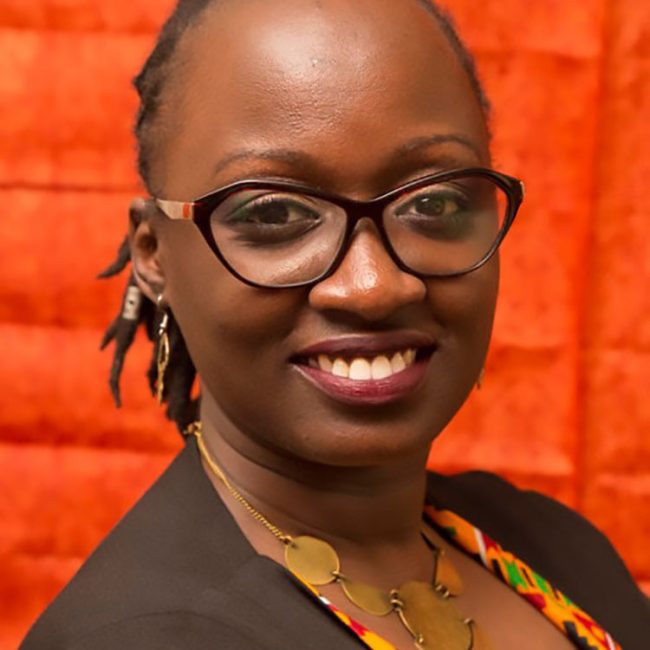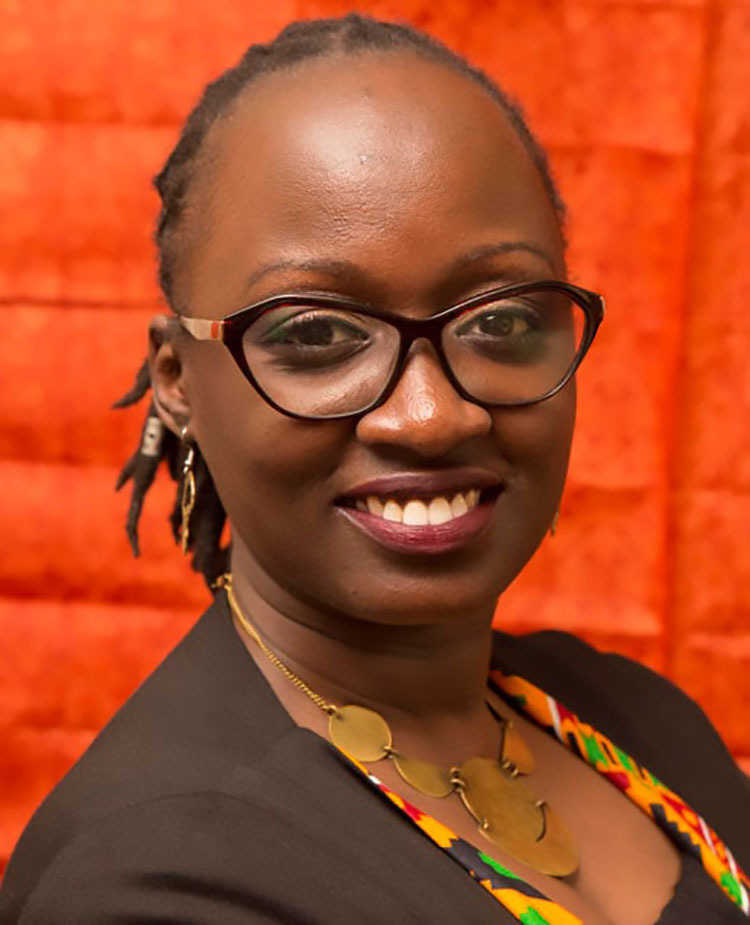Curated conversations with data science for social impact leaders on their career journeys
Pathways to Impact is a series of conversations with data for social impact leaders exploring their career journeys. Perry Hewitt, CMO of data.org, spoke with Angela Oduor Lungati, Executive Director, Ushahidi, about what influenced her leadership career path in the social impact sector.
What was your first role in data for social impact and how did you get into it?
I entered the social impact field with Ushahidi at a fairly young age. My very first interaction with the Ushahidi platform was back in 2010. I started off by volunteering with them during the Constitutional referendum in Kenya.
At that time, I was in the third year of my undergraduate studies at Strathmore University in Nairobi. When I graduated a year later, I reached back out to the team and let them know I was eager to find a way to apply my technical skills. Having been exposed to that community as a volunteer, I was able to see the power of technology for social good firsthand.
That early experience of being able to make use of my technical skills to do something good in the world opened my eyes. It was a new possibility to see this use of technology and data applied to social challenges. To me, this was a new and different approach to helping other people using your skills, rather than your typical 9-5 job. I ended up joining the Ushahidi team as a software development intern in 2011 and then signing on as a junior software developer a couple of months later.
When I think about Ushahidi and some of the other companies that have emerged in the tech scene in Kenya, it's been a result of scratching our own itch: having a lived experience with a particular problem, and then trying to figure out how best to address it.
Angela Oduor Lungati Executive Director Ushahidi
Your degree was in computer science?
Yes. I did my bachelor’s degree in business information technology, which is a mix of both computer science and also some business courses. That particular program at Strathmore was focused on building tech leaders in Kenya.
Was there anything particular about your educational experience that influenced your decision to do social impact or was it more just seeing the world around you?
Honestly, I think it was more about seeing the world around me than any particular academic course. We did have coursework in ethics and philosophy, but the greatest influence was seeing the challenges that we as a society were facing.
When I think about Ushahidi and some of the other companies that have emerged in the tech scene in Kenya, it’s been a result of scratching our own itch: having a lived experience with a particular problem, and then trying to figure out how best to address it. For example, Ushahidi was founded when the nation was mired in post-election violence, and nobody was documenting or sharing anything around that crisis.
This has also been true for some of the other innovative projects we’ve come up with. For example, BRCK was founded in 2013 to focus on bringing internet access to East Africa, and then eventually spun out. The reality we faced included frequent blackouts and inconsistent internet connectivity, yet we had to use infrastructure designed for places like the UK and other high-income countries. The team formed to build something rugged that would accommodate some of these lived realities. The bulk of our tech for social impact innovation has been inspired by our lived reality and context.
So today what are you working on with Ushahidi? What particular social impact problem are you trying to solve?
Our main focus is empowering ordinary citizens to make use of data to solve problems in their communities. Our goal with the Ushahidi platform is to raise the voices of marginalized groups and underrepresented people. Our hypothesis is that typically decisions are getting made in high places without knowledge of or consideration for what ordinary people might be experiencing. As a result, we’ve built the platform to surface the opinions of those ordinary people as a source of data. This will enable data-driven decision-making, using data that is largely representative of the needs of the people on the ground.
We do this work in three main areas of social impact: humanitarian and disaster relief, human rights protection, and good governance. We’re not limited to those three, but these are our primary lenses.
We also use data to make sure that underrepresented groups’ voices are heard, and that decisions being made about them are representative of their expressed needs.
When you say you’re trying to empower the ordinary citizen through data, is that by building platforms they can use? What shape does that work take?
It starts off with our open-source Ushahidi platform that enables massive data collection. We seek to reduce the barriers to entry and interaction by providing various mechanisms through which people can send in their opinions. You can use a text message. You can use email. You can use Twitter. You can use smartphone applications. The platform widens the scope for people to be able to communicate their opinions, and for those opinions to be captured and analyzed.
Beyond the building of the technology itself, we consider how the data gets accessed and used. There is an element of advocacy to this work. It’s powerful to be able to highlight how many people are on this platform saying X around this particular issue and using that knowledge to lobby for change or a particular decision.
Typically, the part that we are responsible for at Ushahidi is building the technology tool itself, and then providing the support and expertise for the grassroots organizations or local NGOs that are using the technology to collect data. And then those organizations will use the data to engage with the ordinary people on the ground and advocate on their behalf. Our contribution based on our own theory of change is creating a platform that can surface and raise people’s voices. As a result, these grassroots organizations are empowered, and data then leads to the change that we want to see in the world.
Part of the Pathways to Impact series
What were some unexpected blockers? Were there blockers around gender or access to the tools you needed or prioritization of the work? I’m sort of curious what were some early challenges you overcame.
At the point I joined the team, there was already a shift going on in the tech industry around trying to get more women in the space. I am one of the lucky ones: the kind of culture that the Ushahidi founders and the rest of the leadership created was very cognizant of the need for diversity and inclusion. There has been such a deliberate effort to make sure that our organization is representative of the kinds of people that we serve. We are intentional in our approach to increase a pipeline of women in leadership positions — I mean, look at me now! — and to women working in the tech industry overall.
I’m grateful that the challenges have not come from within the company itself. I would say that as an organization, we face challenges around sustaining funding. It’s a reality that a woman in leadership, coming from the Global South, can face more challenges in fundraising.
Women in leadership are held to in some ways an impossibly high bar. You need to be very careful about how you conduct yourself and what kind of failures you can permit yourself to accept. Because the world might not be as forgiving as it would be of a man in that same position. You also have to measure your reactions in the workplace. There’s the specter of being called emotional for a strong reaction — because you are a woman.
What community of people or resources bolsters your work?
Throughout my career, I’ve been privileged to have wonderful support, starting with the Ushahidi founders. I am also a founder of women in tech organization called AkiraChix in Kenya, and being involved there expanded my network quite a bit. Through that network, I have access to people whom I look to for advice and mentorship. Day-to-day, I have the support of our board, as well as a leadership coach.
I’m grateful for the engagement and support of my peers, nonprofit leaders in the tech space-based all over the world, in part because Ushahidi is a 501c(3) registered in the US.
Your computer science and business information background are obviously directly applicable to the rise of your career. But is there a non-data science or non-technological skill set that has helped your work?
I’m naturally a very social person. And because of that, one of my core values is helping people. While I didn’t quite realize this until later in my career, this emphasis on helping others has been beneficial. I started at Ushahidi on the software development team but found that I would lean into supporting the users.
That emphasis on helping users helped me transition into being a community manager — trying to act as a bridge between the people building the technology and the ones using it. From there, I became the Director of Community Engagement, building strategic partnerships with different organizations, doing outreach to get community members into Ushahidi, and advocating for open source as important and key to our strategy.
That emphasis on user needs and outreach is perhaps one of the reasons why when the board re-evaluated the future of the organization and focused on taking it back to its roots, I was the one that they came to. As someone who had been such a passionate advocate for focusing on the users, focusing on their needs, and building appropriate tools, I was a stronger candidate for the leadership role. What began as a personal quality ended up being a muscle I built while working at Ushahidi, and helped me rise up the ranks.
What advice do you have for someone new to this field but interested in doing this work?
First and foremost: have an open and very curious mind about learning. Place yourself in spaces where you’re able to learn. I know there are quite a lot of meetups and events where people are talking about data for social impact. There are a lot of organizations that are willing to provide entryways to volunteer. Use those opportunities as a testing ground to see what works and what doesn’t, and where you might fit in. And ask a lot of questions. Please do not be shy about asking questions!
One of the patterns I have noticed in people who are making a transition to social impact is that sometimes there’s this feeling that they need to throw away the skill set that they had before to fit into this new field. And I don’t think that that’s necessarily the case.
Instead, I would look at that skill set as a potential way to bring in a level of diversity of thinking around how to do things with social impact. So come in, obviously, with a curious mind to learn. But come in with confidence, as well, about all the experience that you’ve built up to try and open up opportunities moving forward.
What’s the next big thing that you see in data for social impact? Are there big developments on the horizon, whether it’s around open source or new kinds of data sets?
Right now, I see interesting developments in the realm of public and private data exchanges for social good. There’s an opportunity in transforming the ways the nonprofit sector works with businesses and works with the government for the greater good of the world. I know that there are significant challenges around how these data exchanges happen, and a bit of friction around what different motivations might be.
However, that is still the biggest thing in my mind. A clear impetus for this collaboration is the crisis the world is facing around climate change and our environment. That’s a very, very big one. This shared crisis is really forcing us to think about how we collaborate as all these different organizations to do good in the world. Governance will of course be important.
What’s your go-to daily or weekly read? What keeps you informed and sane in today’s world — which sometimes can feel contradictory?
Informed and sane — I think I’ve probably been relying more on the sane side of things, which then kind of requires me to take a step away from the usual. To stay informed, I definitely look at my Twitter feed, which is very well curated. I follow a lot of different nonprofit leaders in data and tech, whether working in open source or some other focus areas that we work in. I also keep in touch with articles and research from the World Economic Forum.
But when I’m looking to unwind and stay sane I go for fictional books. I confess that I am a huge fantasy nerd. So right now, I am digging into a 14-book series by Robert Jordan called The Wheel of Time. My goal is to try and finish all 14 books this year.
One of the things I’ve really been trying to do as well is deepened my understanding of global economics. It plays such a huge role in so many aspects of social impact — whether we’re looking at food insecurity, humanitarian crises, or challenges around human rights. I’m learning more about the ways economics correlates with, triggers, or accentuates some of the issues that we face in the world. It’s of course helpful to see how these trends influence funding for nonprofit organizations like Ushahidi, and how they inform how we support the organizations we work with more broadly.
About the Author
Perry Hewitt is the Chief Marketing and Product Officer of data.org where she oversees the marketing and communications functions, as well as digital product development.
Read moreSeries
Pathways to Impact
This data.org series interviews leaders in Data Science for Social Impact with a lens of how they got there, as well as the skills and experiences that have fueled their career progression.
data.org In Your Inbox
Do you like this post?
Sign up for our newsletter and we’ll send you more content like this every month.
By submitting your information and clicking “Submit”, you agree to the data.org Privacy Policy and Terms and Conditions, and to receive email communications from data.org.


